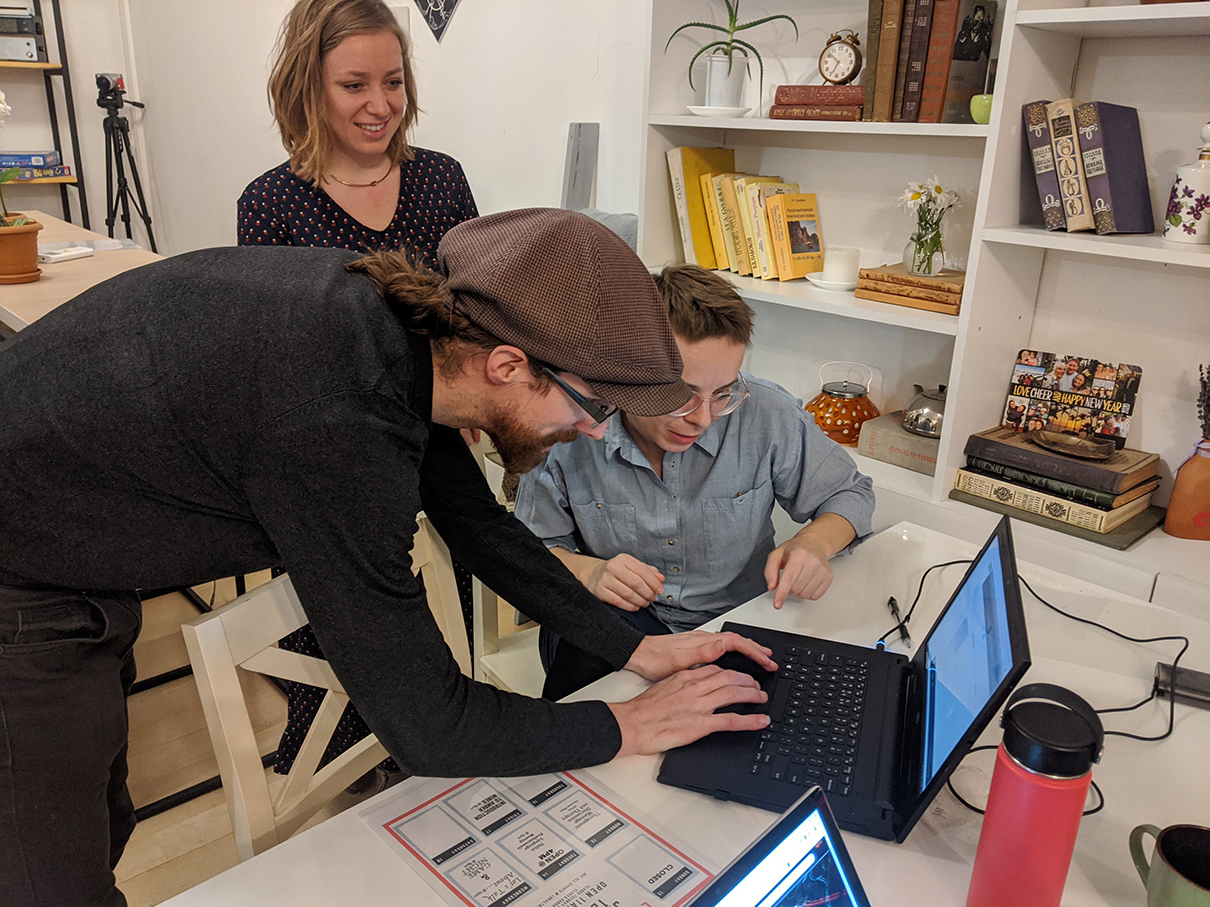From Thailand to Tbilisi: digital nomads come to Georgia

Let’s face it – Georgia isn’t the easiest country in the world to find on a map.
But a growing number of digital nomads can surprisingly point it out, and that’s not just because they’re good at geography: Georgia and Tbilisi are becoming almost instantly-recognizable names in nomad circles, and many hope this will have a positive effect on the Georgian economy via direct spending, international connections, publicity, and entrepreneurship.
On the surface, Georgia doesn’t look like a stereotypical nomad spot, and until recently it’s been relatively unknown.
Many location-independent workers tend to take advantage of their flexible online jobs to visit warm Asian and Latin American nations like Thailand, Indonesia, Vietnam, Colombia or Mexico. Chiang Mai, Thailand, has even gained a reputation as the “digital nomad capital.”
The growing nomad population makes this title an increasingly significant one: MBO Partners , a firm specializing in connecting independent consultants with major enterprises, estimates that there are currently 4.8 million workers that describe themselves as digital nomads, and Nomad List founder Pieter Levels predicts (perhaps somewhat optimistically) that there will be a billion digital nomads by 2035. The U.S remote workforce has grown by 140% since 2005, with 27 companies now operating fully remote, and the trends are pointing towards digital nomads becoming an important part of world travel trends in the coming years.
The nomad nation has very flexible borders, though, and over the past few years, Georgia has quietly become a new hotspot, largely thanks to improving infrastructure, liberal visa policies (95 cou ntries get one year visa-free on entry, with no limit on re-entries), the low cost of living, and more routes being flown by budget-friendly airlines.
Innovative initiatives like WorkFromGeorgia are also helping put Georgia on the nomad map, creating an environment that is not only welcoming to visitors but conducive to creating deeper ties, and nomads themselves are stepping up, starting businesses and even bringing a major nomad event, Nomad Summit, to Tbilisi in May 2020.
Nomad trends
What makes a city or country a good nomad destination? A small survey of Tbilisi nomads says good internet, easy visa policies, access to other countries / low-cost flights, the low cost of living, safety, mild climate and interesting culture are some of the most important aspects, and most nomad blogs will tell you the same.
Georgia checks most of these boxes, though it lacks the tropical climate that tends to dominate nomad Instagram feeds and has historically been a bit of a hike to get to. It’s still relatively mild, though, and low-cost airlines have also been opening up routes to Europe and Asia as tourist interest increases, which could give Georgia an advantage as a convenient base between nomad destinations in Eurasia.
Google Trends shows that searches for terms like “digital nomad Tbilisi” and “digital nomad Georgia” have been on a steady uptick since around 2017, along with an increase in high-profile blog mentions.
Perhaps the most salient metric for the growing Tbilisi/Georgia nomad community, though, is the Tbilisi Digital Nomad Facebook group, which got its start in June 2019 and hit over 900 members by January 2020.
For reference, Chiang Mai Digital Nomads (the most popular group) has 34,000, Digital Nomads Medellin has 7,000, and Mexico City Digital Nomads has around 1,200. Tbilisi’s community hasn’t hit the same scale as the major nomad destinations yet, but it’s growing fast.
Chiang Mai is actually the second-most-common city of residence for the Facebook group’s members (after Tbilisi), which indicates a connection between the two communities and may portend an eventual shift in nomad numbers.
As Thailand’s visa policies become stricter and air quality continues to deteriorate, Georgia’s comparative advantage in both of those categories is pushing it high up the list of nomad destinations.
Tbilisi has also been outperforming on the influential nomad city ranking site, Nomad List, in 2019. The Nomad List algorithm, which scores cities based on a multitude of factors drawn from different data sources, has put Tbilisi in the top 10 several times (topping out at #4 in January 2020). Time series data isn’t directly available, but based on Archive.org snapshots from past years, it seems Tbilisi has improved on Nomad List’s most important metrics since 2016, going from mostly yellow “Okay” ratings to green “Good/Great” ratings for internet and fun, and, somewhat surprisingly, going from “good” to “great” for cost.
Nomad List also mentions the ease of doing business in Georgia as a mark in its favor, and while not every nomad is a business owner/entrepreneur, there is a lot of interest in Georgian tax residency and business registration. As of January 2020, Georgia sits at #7 overall on the Ease-of-Doing-Business Index, and while it can’t quite compete with the online services and EU access offered by a country like Estonia with its e-residency program, Georgia is definitely making an effort to become a favorable place to start and sustain a business.

WorkFromGeorgia: welcoming nomads
Nomads don’t need an invitation to come check a place out, but if they get one they probably won’t turn it down.
A site that lets local spaces offer desks in their office to digital nomads certainly sounds like an invitation, and WorkFromGeorgia hopes that nomads will take it as one.
The idea was originally conceived at Betterfly DDB-a creative agency in Tbilisi-and has proved so popular with nomads and locals alike that the project now has 30 workspaces available across Georgia, bookable via an AirbBnB-like interface.
Initially, says Irina Ghughunishvili, one of the project’s founders, WorkFromGeorgia’s main aim was to attract digital nomads to help compensate for the drop in Russian tourism after the flight ban in July 2019, but she sees a lot of other potential benefits in Tbilisi becoming a new nomad hub. Nomads tend to stay longer and spend more money, but it’s not just their direct contributions to the economy that she thinks are valuable.
“They’re working professionals; they’ve travelled the world,” she says. “They’re interested in a lot of different industries, and even the exchange of ideas on the professional level would be beneficial for Georgia.”
That’s why the founders of WorkFromGeorgia are specifically hoping to connect nomads with locals and cultivate international relationships.
“Everyone wants to really understand and learn more and be engaged in local communities,” Ghughunishvili says. “You can hang out with digital nomads and other travelers and it’s great, but why you are going to the country first of all is because you want to know how people actually live in that country.” Not only can the project help make nomads more involved, but the novelty of the experience can make for excellent social media buzz-something nomads tend to be very good at generating.
WorkFromGeorgia is currently being run by Betterfly as a corporate social responsibility project, but are looking for growth opportunities, as they believe that they could become a valuable part of Georgia’s digital nomad strategy.
Nomad initiatives
Lokal Tbilisi is another project intent on building a positive relationship between Georgia and the digital nomad community, though this one is coming from the nomad side. The coworking/coliving space was started by Candy Treft-a digital nomad from America who came to Tbilisi for a month and ended up extending her stay indefinitely. “I got here in May and extended until June, and extended until July, and ended up not leaving until August,” she says with a laugh, echoing a sentiment common among many longer-term expats and nomads in Georgia.
As the founder of the Tbilisi Digital Nomads Facebook group, Treft saw the potential for growth and created her coworking/coliving space with the goal of giving nomads a way to settle in Tbilisi and quickly connect with the local and nomad community.
“I think there’s potential for both positive and negative impacts,” she says. “A lot of it depends on the mindset of the digital nomads coming in. I find that in a lot of communities the digital nomad culture is very insular… That’s the thing that I’d personally really like to change-that mindset.”
Like the WorkFromGeorgia team, though, Treft believes that there are a lot of opportunities for digital nomads to have a positive impact by supporting local businesses and giving them conduits to larger professional networks. “That’s one of my goals long-term,” she says, “to be able to interact with that local digital community and connect them with the right resources internationally.”
Coming from even further outside Tbilisi is Nomad Summit 2020, a major nomad conference slated to be held at Fabrika from May 22-24. Most Nomad Summit events are held in Chiang Mai (the nomad capital, if you’ll recall), and, though it’s also been to Las Vegas and Cancun, Johnny FD, who has organized the event since 2015, sees Tbilisi as potentially being the next Chiang Mai. “The only thing Tbilisi is currently lacking to really be a world class base for digital nomads and location independent entrepreneurs is a community,” he says. “That’s why we’re bringing ours with us and showing them firsthand what Tbilisi is like and why they should move to Georgia.”
If the nomads attending the event agree, WorkFromGeorgia is likely to play host to a lot more than the approximately 70 nomads it welcomed in 2019. Johnny FD believes the Nomad Summit will do a lot to raise awareness about the perks Georgia has to offer nomads. “With easy 1 year visas , great infrastructure and welcoming people, Tbilisi is prime to be the next digital nomad hotspot,” he says. The Nomad Summit will bring 200 digital nomads from around the world, and really put it on the map, just like we have with Chiang Mai, Thailand in the past.”
Georgia: nomad nation?
Digital nomads in Tbilisi will likely never have the same direct impact that millions of yearly tourists can bring, but the fact that Georgia is in a position to be a hub for this new global workforce is an opportunity that can’t be overlooked-and it’s certainly on the right track so far. As Treft says, “Georgia is a really good example of how the local community is trying to welcome the digital nomad community.”
Unique innovations like WorkFromGeorgia are a fantastic example of how a country might be able to capitalize on some of the best traits that nomad have to offer: a wide range of digital skills, international connections, and a passion for exploring and building.
Of course, since Georgia’s competition is literally every other country/city/state in the world, many of which already have a higher profile and some of which (like Estonia, Lithuania, Serbia, Malaysia, Vermont, and Oklahoma City) have already launched programs targeting nomads, there’s no guarantee how easy it will be for Georgia’s charm to continue to captivate nomads in the long term. The exact value of attracting them also isn’t clear, as the impact of nomads on local economies remains a little-studied topic. Georgia is currently ahead of the curve when it comes to nomad-friendly policies, however, and definitely has the potential to become a good example of the right way to approach the phenomenon.

